U.S.-Turkish relations are enjoying a somewhat warmer moment, following the resolution of the crisis over American pastor Andrew Brunson and the recent dialogue to resolve differences over U.S. cooperation with the mainly Kurdish People’s Protection Units (YPG) militia in northern Syria.
However, Ankara’s commitment to purchase S-400 surface-to-air missiles from Russia presents a big challenge with important geopolitical implications. Among other problems, the plan could get Turkey sanctioned and removed from the U.S.-led program to provide F-35 aircraft. Some experts have recently argued that Turkey is not a valuable strategic partner and that President Trump should bury the U.S.-Turkish alliance. At a moment when the relationship remains fragile, what could be done to avert yet another crisis in bilateral relations now that Turkey has decided to buy the S-400 missiles?
The differences between Washington and Ankara on this issue—and over Syria—are no doubt problematic. At the same time, it is important to recognize that Turkish-Russian relations are far from a real strategic partnership. Hence, there is a pragmatic solution that Washington can pursue to resolve the impasse over the S-400s.
The shadow of history and geopolitical divergences
The most recent Russia-Turkey rapprochement stems mostly from the challenges that instability in Syria creates for Turkish national security. Yet, despite current efforts in Ankara to deepen Russian-Turkish relations and overlook disagreements, Russia has traditionally been a geopolitical rival for Turkey. The annexation of Crimea shifted the naval balance in the Black Sea to Turkey’s disadvantage, a fact that Russia’s top general Valery Gerasimov touted in 2016. Russia’s latest incident in the Kerch Strait will further consolidate Russian naval primacy in the Black Sea.
Turkey’s often unspoken (or overlooked) geopolitical rivalry with Russia is likely one of the main reasons why Ankara lists Ukraine, Georgia, and Azerbaijan as strategic partners, while Russia is referred to just as a major trade partner.
Russian-Turkish cooperation in Syria
The Syrian conflict brought the two sides into a confrontation when Turkey shot down a Russian warplane in November 2015 and Russia responded by imposing harsh economic sanctions on Turkey. Subsequently, both sides were able to patch up their differences and embarked on a process of rapprochement, with Turkish President Recep Tayyip Erdoğan issuing a personal letter of regret for the incident to Russian President Vladimir Putin. Thanks to Russian consent, the Turkish military was able to conduct two cross-border operations in Syria: Operation Euphrates Shield against ISIS, and Operation Olive Branch against the Kurdish YPG—the armed wing of the Kurdish political party Democratic Union Party (PYD) in Syria—in the Afrin region of northwestern Syria.
In 2015 and 2016—when terrorist attacks originating from Syria were occurring inside Turkey and the United States remained aloof to Turkey’s calls for a buffer zone in northern Syria—Russia emerged as Ankara’s only viable partner. The close cooperation with Turkey has played into Russia’s geopolitical goal of trying to peel Turkey away from NATO. Furthermore, this cooperation also helped Russia alleviate some of the military burden of supporting the Bashar al-Assad regime by getting Turkey to convince the moderate opposition to support a ceasefire and come to the negotiation table for a long-term solution.
Since January 2017, the two have coordinated 11 rounds of peace talks in Astana, Kazakhstan, together with Iran. In September, President Recep Tayyip Erdoğan convinced President Vladimir Putin to support an extended ceasefire and construction of a demilitarized zone in the northwestern province of Idlib to preempt an onslaught by Syrian regime forces into the last opposition-held area. In so doing, regional geopolitical disagreements were conveniently sidelined. In the same vein, it is notable that Ankara has not joined Western sanctions on Russia and shied away from openly criticizing Russia over the recent Kerch Strait incident.
Turkey shares a long border with Syria and benefits from its current cooperation with Russia. However, in the long run, Putin and Erdoğan have divergent interests in Syria. Most importantly, Russia continues to back the Syrian Kurds and has hosted a PYD office in Moscow since early 2016 (despite its tacit approval of Turkey’s Afrin operation). Ankara considers the PYD an offshoot of the Kurdistan Workers’ Party (PKK), an organization that has been fighting the Turkish state since the early 1980s and which Turkey, the United States, and NATO consider a terrorist organization. Moscow wants the PYD to be included in the negotiations to achieve a sustainable peace in Syria. So far, Turkey has resisted PYD’s participation in the “constitutional committee” critical to advancing a political settlement in Syria, a problem that U.N. special envoy Staffan de Mistura has acknowledged.
Second, it is unclear for how long Russia will tolerate the presence of Turkish troops in Syria. Putin has on various occasions clearly stated that he wants all foreign forces to eventually leave Syria, especially those without the invitation of the Syrian government. Third, the ceasefire over Idlib is very fragile, and it would hardly be surprising to see a green light from Moscow allowing regime forces and Iran-backed militias to launch an Idlib campaign—especially if Turkey fails to rein in extremist groups defined as terrorists by the Astana process. If Idlib turns into the next battlefield in Syria, Turkey risks facing another refugee crisis with dire humanitarian consequences and potential threats to Turkey’s stability and national security.
Finally, Ankara and Moscow will continue to disagree over the future of Syrian President Assad. Unlike Putin, Erdoğan continues to entertain the idea of a future Syria without Assad.
Don’t push Turkey away
A recent public opinion survey in Turkey shows that Turks do not see Russia as a friend, but do think Turkey and Russia can cooperate in international issues. Anti-Americanism, on the other hand, is on the rise and many see the United States as threatening to Turkey.
This dampens the prospects for a meaningful rapprochement between the United States and Turkey. On the Turkish side, a constant drumbeat fed to the public about, as one analyst put it, “exiting the West” further aggravates the relationship. Rampant anti-Americanism, often encouraged by the government itself, culminates in uncritical calls for closer relations with Russia. But despite the government’s domestic narrative—including accusations that NATO is a terrorist organization that threatens Turkey—Ankara has given no sign that it will break away from the trans-Atlantic alliance. Strikingly, Erdoğan has also stopped calling on Putin to help Turkey join the Shanghai Cooperation Organization in the place of the EU. Instead, the sheer reality that Turkey still needs the West—as noted by one former ambassador and deputy undersecretary of the Turkish ministry of foreign affairs—keeps Turkey reliant on NATO.
Turkey is stuck with having to buy S-400s out of the momentum built into Russian-Turkish rapprochement. But the move will in fact harm Turkey’s national security interests, since the full deployment and operationalization of the missiles would seriously undermine Turkey’s relationship with the United States and NATO. In short, Turkey cannot afford to sleepwalk out of the trans-Atlantic alliance for the sake of S-400s.
It’s important to see that while the S-400 purchase is significant, it is extremely unlikely to lead Turkey to a strategic switch toward Russia and away from the West. The United States must respond with that in mind, and should not react in a way that inadvertently pushes Turkey away from the trans-Atlantic alliance. That would only serve Russia’s interests, making it easier for Russia to pursue its geopolitical ambitions from the Baltic to the Black Sea and in the Middle East. Therefore, the issue of sanctioning Turkey and excluding it from the F-35 program should be approached cautiously. Instead, Washington, Ankara, and their NATO partners should double their efforts to find a pragmatic solution to the purchase of Russian S-400s. This could, for example, involve limiting the operationalization of missiles in a manner that does not jeopardize NATO member countries’ immediate security concerns, such as digital espionage and cyber hacking, rather than demanding at this late stage an outright cancellation of the purchase. Alternatively, the United States could revisit the possibility of selling Patriot surface-to-air missiles to Turkey that satisfies the latter’s long-standing demands on pricing and technology transfer. Given that conflict persists in the Middle East–with Iran, Syria, and others equipped with offensive missile capabilities—Turkey’s demands for a missile defense system will persist, too.
With this approach, two main goals can be achieved: Russia and Turkey can continue their pragmatic cooperation in Syria to promote relative calm and stability there, and Turkey’s missile purchase can be managed such that it doesn’t result in more fundamental problems in the trans-Atlantic alliance.
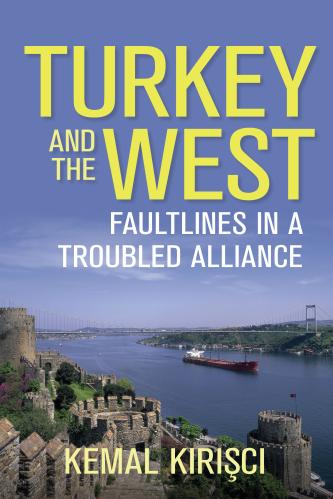
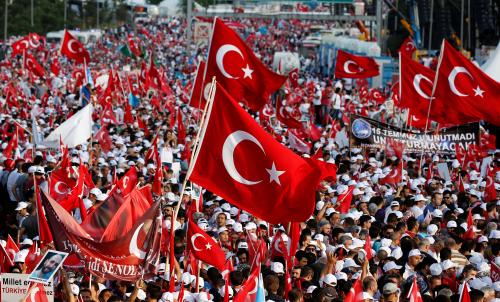
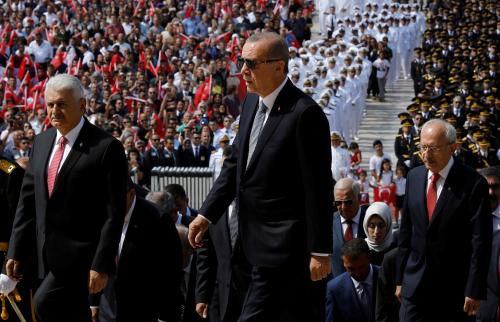


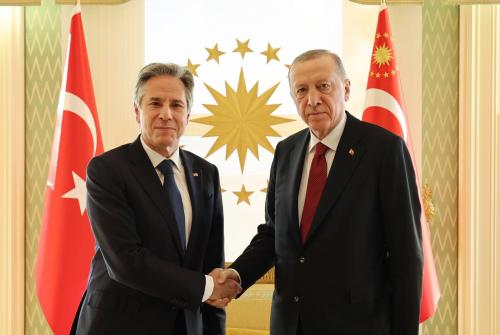
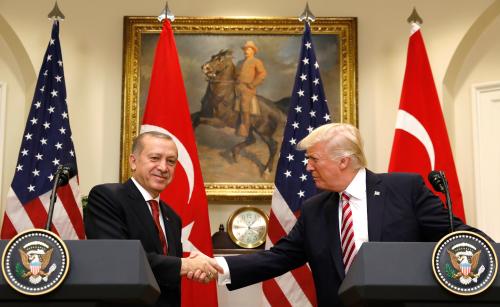
Commentary
Don’t let Russian S-400s peel Turkey away from the West
December 18, 2018